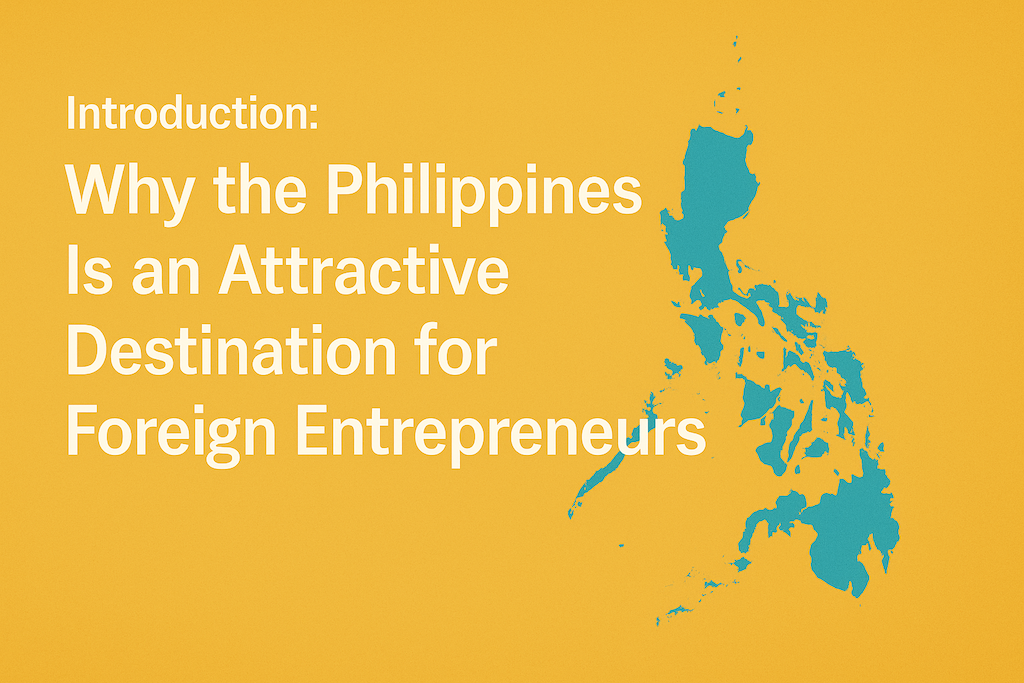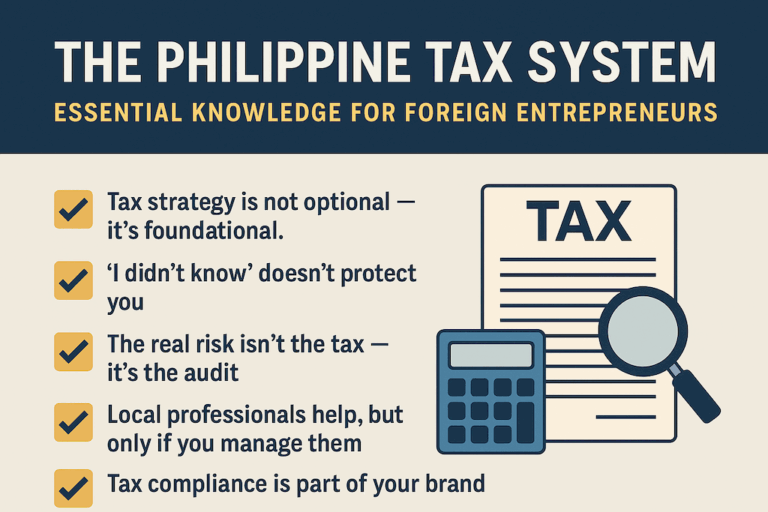Introduction: Why the Philippines Is an Attractive Destination for Foreign Entrepreneurs
✅ Introduction: Why the Philippines Is an Attractive Destination for Foreign Entrepreneurs
In recent years, the Philippines has emerged as one of Southeast Asia’s most promising markets, drawing attention from entrepreneurs and companies around the world. Once considered a “developing country,” the nation has seen rapid improvements in infrastructure, internet connectivity, and financial systems. With over 100 million English-speaking people, it now holds substantial potential for international business.
◉ Rapid Economic Growth and a Rising Middle Class
The Philippine economy has maintained a strong annual growth rate of 5–7% in recent years. Industries such as services, IT, tourism, and construction continue to flourish. As of 2025, a growing middle class driven by youthful spending power is creating more opportunities, especially in urban centers—making it a fertile ground for B2C businesses.
◉ Young Population and Skilled Talent Pool
The country has a significant demographic advantage, with an average age of around 24–25. The labor force is abundant, and this “demographic dividend” is expected to continue for decades. In key cities like Manila and Cebu, college-educated, English-speaking professionals can be hired at relatively low costs, offering a clear edge for startups and small businesses.
Young Filipino talent excels in industries such as IT, customer service, education, and digital marketing—especially where English communication is essential.
◉ A Culturally Open and Foreigner-Friendly Environment
The Philippines is widely recognized for its open and hospitable culture toward foreigners, thanks to its long-standing connections with the U.S., Japan, and other countries. In cities like Cebu and Manila, it’s common to see restaurants, language schools, and startups owned or run by foreigners. Doing business in English and maintaining smooth communication with local staff are both practical advantages for foreign entrepreneurs.
◉ Low Barrier to Entry
With lower labor and rental costs compared to many other countries, the Philippines allows for cost-effective business launches. Furthermore, several market segments are still underdeveloped, offering space for unique or niche business models that may not survive in more saturated, competitive markets.
In short, the Philippines offers growth potential, affordable talent, and a culturally accepting environment. However, navigating its legal framework and local business culture is essential to succeeding. This guide outlines the step-by-step process for legally establishing and operating a business as a foreigner in the Philippines.
✅ Step 1: Understand the Legal Restrictions Before You Start
One of the most critical elements to understand when launching a business in the Philippines is the foreign equity restriction. Foreign nationals, including Japanese citizens, may face limitations on ownership percentages depending on the industry. Knowing these restrictions in advance is essential to avoid legal or operational issues.
◉ Foreign Investment Negative List (FINL)
The Philippine government maintains a Foreign Investment Negative List (FINL) that specifies industries where foreign ownership is restricted or prohibited. In these cases, foreign equity is limited to a maximum of 40%.
Common restricted sectors include:
-
Retail (with some exceptions)
-
Food and beverage businesses
-
Service-oriented businesses (unless meeting specific conditions)
-
Personal care, massage, education, and other domestic services
For example, opening a café or English school in Cebu would require using a Filipino nominee or majority shareholder, meaning the legal structure must reflect Filipino majority ownership—even if the foreigner provides the capital and business plan.
◉ When 100% Foreign Ownership is Allowed
Under certain conditions, 100% foreign ownership is allowed. These include:
① Export-Oriented Enterprises
Businesses that export at least 60% of their output abroad—such as manufacturing, IT outsourcing, or product processing—can be 100% foreign-owned.
② PEZA-Registered Enterprises
Companies registered under the Philippine Economic Zone Authority (PEZA) and operating within a PEZA-designated area are also eligible for full foreign ownership.
◉ What is PEZA?
The Philippine Economic Zone Authority (PEZA) is a government body that promotes foreign investment through economic zones and offers a range of incentives, including:
-
Corporate income tax holidays (up to 4–6 years)
-
Exemption from import duties
-
Permission for 100% foreign ownership
-
Full repatriation of profits
Many IT and BPO companies in Manila and Cebu operate within PEZA-accredited buildings located in IT parks, benefiting from these advantages.
PEZA is ideal for online services, tech startups, and export-oriented businesses, offering both legal and tax advantages.
◉ Capital Requirements Based on Ownership
If a foreigner owns more than 40% of a company, they are typically required to inject a minimum paid-up capital of USD 200,000 (approx. PHP 11 million).
Even online services targeting the local market may fall under this requirement.
In contrast, if the ownership is limited to 40% or less, the capital requirement may be as low as PHP 5,000 to PHP 10,000, but this structure means reduced control and authority over the company.
🔍 Summary: Choose the Right Model Based on Your Business Type
The optimal company structure in the Philippines depends heavily on your business model and target market.
If your company is export-oriented or PEZA-registered, full foreign ownership is viable. However, if your business targets the local market (e.g., cafes, language schools, or retail), you will need a Filipino partner or nominee structure—which requires extreme caution and reliable legal support.
In the next section, we’ll walk you through the actual process of registering a company and the documents you’ll need.
✅ Step 2: How to Register a Company in the Philippines – Process and Required Documents
When starting a business in the Philippines, having a great idea and sufficient funding is not enough. Registering a legal entity is a fundamental requirement—especially for foreign entrepreneurs. Without proper registration, you won’t be able to obtain a business permit or even open a corporate bank account.
This section explains the standard registration process for a domestic corporation, along with the relevant government agencies and required documents.
◉ Basic Steps for Company Registration (Domestic Corporation)
-
Reserve your business name with the SEC
-
Draft and notarize Articles of Incorporation and By-laws
-
Open a provisional corporate bank account and deposit paid-up capital
-
Register your company with the SEC
-
Register with the BIR (Bureau of Internal Revenue) and get your TIN
-
Obtain a Mayor’s Permit from the local government
-
Register with SSS, PhilHealth, and Pag-IBIG for employee benefits
◉ What is the SEC? (Securities and Exchange Commission)
The SEC (Securities and Exchange Commission) functions similarly to both the Corporate Registry and Financial Regulator in the Philippines. All corporations, including foreign-invested ones, must register with the SEC before conducting any business.
Required documents for SEC registration include:
-
Name Verification Slip
-
Articles of Incorporation
-
By-laws
-
Treasurer’s Affidavit and shareholder details
Upon approval, the SEC will issue a Certificate of Incorporation, which legally establishes your company.
◉ Paid-Up Capital and Provisional Bank Account
Before your SEC registration is approved, you must deposit your paid-up capital into a provisional corporate bank account. If the foreign equity exceeds 40%, a minimum paid-up capital of USD 200,000 may apply.
Many banks in the Philippines allow you to open a temporary bank account for incorporation purposes, which can be converted into a full corporate account once the SEC registration is complete.
◉ What is the BIR? (Bureau of Internal Revenue)
The BIR is the national tax authority of the Philippines. Once your company is registered with the SEC, you must register with the BIR to:
-
Obtain a TIN (Taxpayer Identification Number)
-
Get Authority to Print official receipts
-
Register your accounting books
-
Register for VAT (if applicable)
Without BIR registration, your company cannot legally issue receipts, collect payments, or file taxes.
◉ What is a Mayor’s Permit?
A Mayor’s Permit is the local government’s official license to operate a business, similar to a business license in other countries. It is issued by the City Hall in the area where your business is located.
Commonly required documents include:
-
SEC Certificate of Incorporation
-
BIR Registration Certificate
-
Lease Contract or proof of business address
-
Clearance from the Fire Department and Sanitary Office
The process may take a few days to several weeks, depending on the location and complexity of the business.
◉ Mandatory Social Insurance Registration: SSS, PhilHealth, Pag-IBIG
If you plan to hire even one local employee, you are legally required to register with the following three government agencies:
① SSS (Social Security System)
This is the national pension and social insurance program. Contributions are shared between the employer and the employee and are based on the employee’s monthly salary.
-
Covers retirement, disability, unemployment, and death benefits
-
Failure to register may result in penalties or suspension of your business license
② PhilHealth
PhilHealth is the public healthcare insurance system in the Philippines. It provides partial coverage for hospitalization and medical procedures.
-
Premiums are shared by employer and employee
-
Government hospitals provide discounted or free services upon presentation of a PhilHealth ID
-
Mandatory for all employees, especially for low-to-mid-income earners
③ Pag-IBIG Fund (Home Development Mutual Fund)
Pag-IBIG is a government-run housing assistance program. It enables employees to apply for low-interest housing loans after contributing for a minimum period.
-
Contribution is 1–2% of the employee’s monthly salary (matched by the employer)
-
Also functions as a savings and welfare system
-
The name stands for: Pagtutulungan sa Kinabukasan: Ikaw, Bangko, Industriya at Gobyerno (“Working Together for the Future: You, Banks, Industry, and Government”)
✅ What Business Owners Must Do
After registering with all three agencies, you must:
-
Calculate monthly contributions during payroll
-
File reports and payments regularly (usually online)
-
Consider assigning an HR/payroll staff or outsourcing to a local accountant to manage compliance
✅ Summary: Consider Hiring a Legal or Accounting Expert
Registering a corporation in the Philippines involves multiple steps and interaction with various government agencies. For foreign entrepreneurs, additional scrutiny is common, and the process typically takes 1 to 2 months to complete.
To streamline the process:
-
Work with an experienced lawyer or business consultant
-
Communicate regularly with your local partners
-
Double-check all documents in English and Filipino
In the next section, we will cover how to obtain the right visa or residence permit to legally live and work in the Philippines after registration.
✅ Step 3: Visa and Residency Options for Foreign Entrepreneurs
Even if you successfully establish a company in the Philippines, you won’t be able to operate it effectively unless you, as a foreigner, can legally reside in the country mid- to long-term. Staying under a tourist visa limits what you can do—it may even prevent you from opening a bank account or signing a lease.
Here, we break down the main types of visas available for foreigners who wish to start and run a business in the Philippines.
◉ ① 13A Visa (Spousal Visa / Permanent Resident Visa)
The 13A visa is available to foreigners who are legally married to a Filipino citizen. It provides permanent resident status and is considered one of the most flexible and powerful visa options in the Philippines.
-
Requires marriage to a Filipino citizen
-
Initially granted as a 1-year probationary visa, then converted to permanent residency
-
Allows full employment and business activities without restriction
-
You can register a company in your own name
-
Valid indefinitely (subject to regular renewals)
This is an ideal visa for those seeking long-term residence with full legal freedom to operate a business.
◉ ② 9G Visa (Pre-arranged Employment Visa)
This visa is issued to foreign employees of a Philippine-based company, which includes entrepreneurs who appoint themselves as officers or managers of their own corporation.
-
The local company acts as the visa sponsor (employer)
-
Requires approval from the DOJ and Bureau of Immigration
-
Processing time is typically 2 to 3 months
-
Valid for 1 to 3 years, renewable
-
Spouse and children can apply for dependent visas (13D)
Most business owners apply for this visa after completing company registration, making it a practical choice for those planning to stay and work in the country mid- to long-term.
◉ ③ SRRV (Special Resident Retiree’s Visa)
Though originally designed for retirees, the SRRV can also be used by foreigners who meet specific conditions and want to reside in the Philippines for business purposes. However, starting from 2024, the requirements have become more stringent.
-
Applicants must be 50 years old or older (previously 35+)
-
Requires a police clearance and medical certificate
-
Requires a deposit of USD 10,000 to USD 50,000 in a designated bank (depending on SRRV type)
-
Employment is prohibited, but you may act as a company owner or board member
SRRV holders enjoy almost indefinite residency status (with only annual renewal fees), and they do not need to frequently exit the country like those on tourist or 9G visas.
◉ ④ Tourist Visa Extensions + Filipino Nominee Model (⚠ Gray Area)
The easiest and most common short-term workaround is to stay under a tourist visa while operating the business under a Filipino nominee’s name.
-
Free tourist visa valid for 30 days upon arrival
-
Can be extended monthly or every 2 months, up to 36 months total
-
Company is registered under a Filipino partner’s name, while the foreigner acts as the behind-the-scenes manager
-
Commonly used in small businesses such as cafés or ESL schools
⚠ However, this is legally a gray area. If the Bureau of Immigration suspects misuse, it can lead to fines, deportation, or a blacklist. This approach is best used only as a short-term solution during the startup phase.
✅ Which Visa is Right for You?
| Visa Type | Description | Business Activity | Age Requirement | Stability |
|---|---|---|---|---|
| 13A (Spouse) | Permanent residency with full flexibility | ✅ Yes | Filipino spouse required | ★★★★★ |
| 9G (Work Visa) | Corporate-sponsored work visa | ✅ Yes (Officer) | None | ★★★★☆ |
| SRRV (Retiree) | Deposit-based, age-restricted residency | ⚠ Business only, no employment | 50+ | ★★★★★ |
| Tourist Visa + Nominee | Easy but unstable | ⚠ Behind the scenes only | None | ★★☆☆☆ |
✅ Summary: The Right Visa Is Essential for Sustainable Business
Choosing the right visa impacts your residency stability, freedom to conduct business, and ability to bring your family. In many cases, it’s realistic to start with a tourist visa for market research, then transition to a 13A or 9G visa once your business setup is underway.
In the next section, we’ll dive into how to find trustworthy local partners and avoid common legal pitfalls related to nominee arrangements.
✅ Step 4: Choosing a Trustworthy Local Partner or Nominee
For many foreign entrepreneurs, one of the most common and costly mistakes in the Philippines is entering a nominee or partnership arrangement without fully understanding the risks.
As previously mentioned, some industries require a Filipino majority shareholder due to foreign ownership restrictions. In these cases, choosing a reliable local partner—or nominee—is essential. But more important than the person you choose is how well your agreements are legally documented and enforced, ideally through the support of a competent lawyer.
◉ In the Philippines, Lawyers Are Not Just Legal Experts—They Control the Process
Unlike in many countries where lawyers act mainly as advisors or courtroom representatives, Filipino lawyers play a highly practical and powerful role in business operations, especially in areas like incorporation, property, and employment law.
Their influence extends to:
-
Drafting and amending your Articles of Incorporation
-
Structuring nominee arrangements and drafting Memorandums of Agreement (MOAs)
-
Mediating and resolving disputes before they reach litigation
-
Acting as intermediaries with local government units and tax offices
In short, a good lawyer can open doors, while a bad one can shut your business down. In many cases, they are the ones who truly control the process.
◉ Drafting a Clear and Notarized Agreement Is Non-Negotiable
If you register your company under a Filipino partner’s name, it is absolutely essential to prepare a legally binding agreement (MOA) that outlines:
-
Actual ownership and investment contributions
-
Profit-sharing and decision-making rights
-
Terms of business sale or transfer
-
Capital return mechanisms
-
Asset distribution in case of dissolution
This document should be drafted and notarized by a lawyer. Without it, there is nothing stopping the nominee from claiming full ownership and taking over the business—a scenario that has happened to many foreigners.
◉ Finding a Trustworthy Lawyer: Much Harder Than You Think
Let’s be clear: finding a truly trustworthy lawyer in the Philippines is not easy, especially for foreigners.
While some attorneys uphold high standards, others unfortunately take advantage of uninformed foreign clients. This is particularly common in high-stakes matters like real estate, incorporation, or nominee agreements.
Common red flags include:
-
Charging high fees upfront but failing to deliver results
-
Secretly working with your nominee against you
-
Drafting vague or one-sided contracts to remove you from the business later
These situations occur most often when foreigners hire a lawyer without a personal referral. A legal license alone does not guarantee ethics or client-first service. Never assume that “lawyer = safe.”
✅ Rules for Choosing the Right Attorney
-
Ask for referrals from other foreigners or expats doing business locally
This is by far the safest and most effective approach. -
Confirm experience handling foreign clients and nominee cases
Even better if the lawyer has worked specifically with Japanese clients. -
Get a written scope of work, fee structure, and timeline before hiring
Avoid lawyers who say “we’ll sort it all out later” or provide vague estimates. -
Consult more than one lawyer to compare professionalism and transparency
Don’t just go with the first one you meet.
✅ A Good Lawyer Values Trust Over Money
Reliable lawyers prioritize long-term relationships, trust, and transparent communication. In contrast, those who are only after short-term profit often show subtle red flags early on—such as overpromising, vague answers, or pushing rushed decisions.
During the early stages of your business, it’s tempting to place blind trust in a professional out of desperation or pressure, but this is precisely when you need to be most cautious.
In the Philippines, being “too careful” with legal matters is never a bad thing.
✅ Final Words: In the Philippines, Everything Must Be in Writing
In the Philippines, oral agreements or unspoken understandings don’t hold up.
The only thing that truly protects you is a legally documented, notarized contract.
To stay safe:
-
Never operate without a written and notarized agreement with your nominee
-
Consider engaging your lawyer on a retainer or per-project basis
-
Continue legal checkups even after incorporation
✅ Final Summary: Success in the Philippines Depends on Preparation
The Philippines stands out among ASEAN countries with its English-speaking population, economic growth, and openness to foreign investment. It’s an appealing destination for entrepreneurs from around the world.
However, launching a business here as a foreigner means navigating entirely different legal, cultural, and administrative systems. Passion and money alone are not enough—you need solid preparation.
◉ Legal Awareness is the Minimum Requirement
You must understand:
-
Foreign ownership limits
-
The Foreign Investment Negative List
-
Capital requirements
-
PEZA incentives
-
Visa options
Knowing the law isn’t just a requirement—it’s a competitive advantage in the Philippines.
◉ The Right Visa is the Foundation for Stability
Even with a fully registered company, your ability to live and work legally is just as important. Choosing the right visa—13A, 9G, SRRV, or Tourist—is essential, based on your family situation and funding level.
Visa applications are often tied to company structure, so timing your application carefully is key, especially for 9G.
◉ Choosing the Right Partner or Lawyer is Everything
A successful business can crumble overnight due to betrayal by a nominee or lawyer.
Having strong legal contracts and professional allies from the start can increase your chances of long-term success dramatically.
◉ Administrative Work Continues After Incorporation
After launching your company, you’ll still need to handle:
-
Business permits
-
BIR (tax) registration
-
Mandatory employee insurance (SSS, PhilHealth, Pag-IBIG)
Neglecting these duties could lead to penalties, suspension, or even government harassment.
Business in the Philippines is not just about starting—it’s about building a structure that can survive and grow.
✅ Final Thoughts: The Philippines is Full of Potential—But Not Without Risks
Starting a business in the Philippines is more accessible than in most developed countries. With the right idea and timing, it’s possible to succeed with limited capital.
However, those who underestimate the legal and cultural complexity often fail.
That’s why thorough preparation and cautious execution are the keys to success.
In the next article, we’ll explore real-world failure cases and the lessons foreign entrepreneurs have learned the hard way. Don’t miss it.




